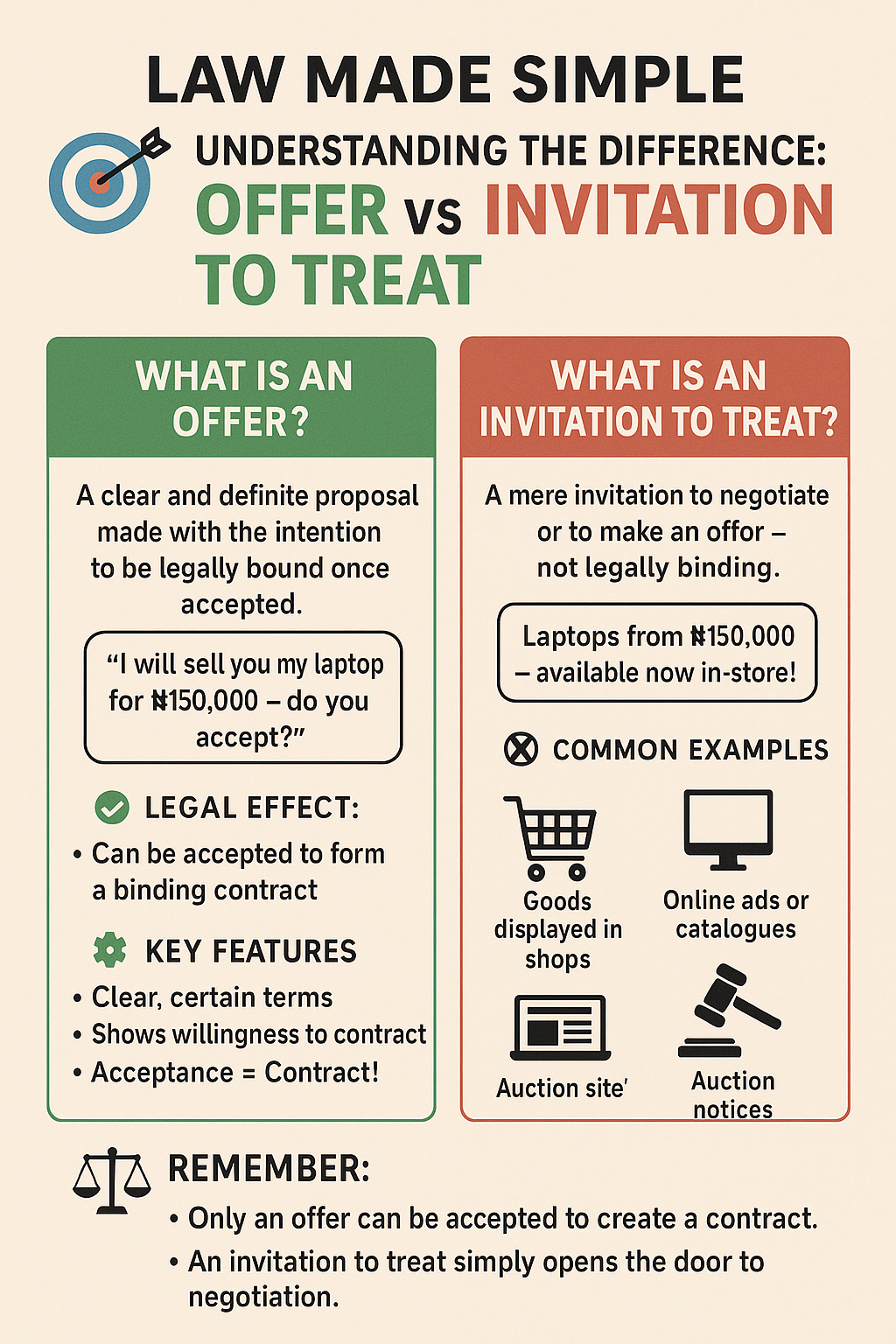By P.L. Osakwe
Abstract
The traditional legal maxim that "an unsigned document is a worthless piece of paper" has long guided legal thought in contract enforcement. However, in modern jurisprudence and practical commercial realities, this principle is not absolute. Courts are increasingly recognizing that a person may still be bound by an agreement they did not formally sign, through doctrines like part performance, estoppel, implied conduct, electronic communications, and even verbal agreements. This article explores the legal frameworks and precedents that may hold a person accountable despite the absence of a signature, with a particular focus on Nigerian and comparative common law perspectives.
■ INTRODUCTION
In contract law, a signature is widely regarded as a fundamental proof of consent. It is the tangible mark of agreement. Yet, law is not blind to circumstances where parties act as though a contract exists, even if they never signed one. In the words of Lord Denning, “you cannot escape liability by failing to sign if your conduct clearly shows you intended to be bound.”
So, what happens when a person refuses to sign a document but still performs the obligations within it? Can they escape liability merely because their signature is missing? This article explores how modern legal systems, including Nigeria’s, treat unsigned documents, and the circumstances under which such documents can still give rise to legally binding obligations.
1. The General Rule: A Signature Demonstrates Intention to be Bound
At its core, a signed document is the clearest evidence of consent. In formal transactions, especially those involving real property, employment, or high-value contracts, the absence of a signature may render a contract unenforceable. This is particularly true where statutes require written and signed agreements, such as under the Statute of Frauds or the Land Use Act in Nigeria.
But even in such cases, the courts are not limited to signatures alone.
2. Exceptions to the Rule: When an Unsigned Document Can Still Bind
2.1 Doctrine of Part Performance
Under equity, a party who has partially performed their side of a bargain may prevent the other from denying the existence of a contract. Nigerian courts have applied this principle in land and tenancy disputes, especially when tenants have paid rent, occupied land, or made improvements.
Even in the absence of a signed document, the actions of both parties may speak louder than ink.
2.2 Electronic Signatures and Digital Consent
The rise of e-commerce and digital communication has prompted courts to redefine what counts as a “signature.”
■ Typed Names in Emails
A person who types their name in an email indicating consent may be held bound by the terms discussed.
■ Click-Wrap and Browse-Wrap Agreements.
Common on websites, these refer to situations where users click “I agree.” Courts have upheld the enforceability of such actions.
□ Relevant Law:
Under Nigeria’s Evidence Act 2011, Section 93(2) validates electronic signatures, provided they are reliable and appropriate under the circumstances.
Thus, consent given electronically may have the same weight as a traditional signature.
2.3 Verbal Agreements and the Role of Oral Contracts
Contracts need not always be in writing. In many sectors, transport, sales, domestic services, verbal contracts are valid and enforceable.
● Challenge: Proof.
Solution: Supplement oral agreements with text messages, call records, or witness testimony.
Caveat: Certain agreements, like contracts for the sale of land (under the Statute of Frauds), must be in writing and signed to be enforceable.
2.4 Implied Contracts Through Conduct
The law may infer a binding agreement from consistent behavior that reflects mutual understanding.
Example: A person repeatedly uses a service and pays for it without ever signing a formal contract. A court may conclude that an implied-in-fact contract exists.
This is especially common in landlord-tenant relationships, informal partnerships, and long-standing commercial dealings.
2.5 Promissory Estoppel
Under the doctrine of estoppel, a person who makes a promise, upon which another relies to their detriment, may be bound to fulfill it, even without a formal contract.
Example: A landlord promises to extend a tenant’s lease, and the tenant renovates the space relying on that promise. If the landlord reneges, estoppel may prevent them from denying the lease extension.
Estoppel is an equitable remedy to prevent unjust enrichment and dishonorable conduct.
2.6 Unsigned Documents as Supporting Evidence
Even if unsigned, a document may still have legal relevance:
○ As evidence of negotiations.
● As proof of intent to contract.
As a guide to interpreting other related conduct or communications.
Courts may consider the unsigned document together with other materials, text messages, prior drafts, payment records, or oral confirmations, to determine whether a binding contract was formed.
3. Nigerian Judicial Position
Nigerian courts have shown flexibility in assessing unsigned documents in context:
“Where parties act on the terms of an unsigned document, the courts are entitled to infer a binding agreement.”
This position reflects a willingness to prioritize substance over form, intent over technicality.
4. Practical Tips for Avoiding Disputes Over Unsigned Documents
● Always follow up on oral or electronic agreements with written confirmation.
● Request acknowledgment of receipt or approval via email or SMS.
● Ensure performance of the agreement aligns with the drafted terms.
● In digital transactions, retain IP addresses, timestamps, and consent logs.
■ Conclusion
While the absence of a signature may raise red flags, it is not always fatal to enforcement. Nigerian law, like other common law jurisdictions, recognizes a range of doctrines that allow for accountability in the absence of formal signing.
Whether through part performance, digital consent, implied conduct, or estoppel, the courts will ask a simple question: Did the person intend to be bound, and did they act accordingly?
When the answer is “yes,” even silencebor the absence of ink, may speak volumes.
“In law, a signature is proof, but conduct is conviction. You can’t escape a promise simply because you didn’t pick up a pen.”
P.L. Osakwe



